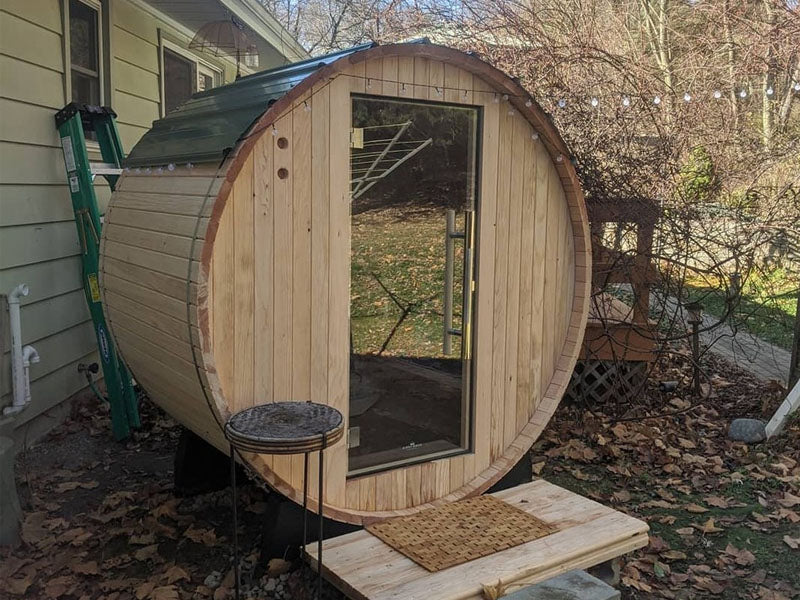What materials are safe for outdoor sauna?
•Posted on July 24 2023

When it comes to building an outdoor sauna, choosing the right materials is crucial to ensure the safety and longevity of the structure. Outdoor saunas are exposed to various weather conditions, including rain, snow, and extreme temperatures, which can cause damage to the materials used in construction. Therefore, it is essential to select materials that are durable, weather-resistant, and safe for use in a sauna environment.
Here are some materials that are safe and suitable for outdoor saunas:
1. Cedarwood: Cedarwood is one of the most popular choices for building outdoor saunas. It is naturally resistant to decay, rot, and insect infestation, making it an ideal material for outdoor use. Cedarwood also has a pleasant aroma that enhances the sauna experience.
2. Redwood: Redwood is another popular choice for building outdoor saunas. It is durable, weather-resistant, and has a natural resistance to decay and insect infestation. Redwood also has a beautiful color and texture that adds to the aesthetic appeal of the sauna.
3. Hemlock: Hemlock is a softwood that is commonly used in sauna construction. It has a light color and a smooth texture that gives the sauna a modern and sleek look. Hemlock is also resistant to decay and insect infestation, making it a suitable material for outdoor use.
4. Stainless steel: Stainless steel is an excellent material for building outdoor saunas because it is resistant to rust and corrosion. It is commonly used for the sauna heater, chimney, and other components that are exposed to high temperatures.
5. Glass: Glass can be used for the windows and doors of an outdoor sauna. It provides natural light and enhances the overall aesthetic appeal of the sauna. However, it is essential to choose tempered glass that can withstand high temperatures and thermal shock.
6. Stone: Stone can be used for the flooring and walls of an outdoor sauna. It provides a natural and rustic look that complements the outdoor environment. However, it is essential to choose stones that are resistant to heat and moisture.
When selecting materials for your outdoor sauna, it is also important to consider their environmental impact. Choose materials that are sustainably sourced and have a low carbon footprint. This will not only benefit the environment but also contribute to the overall health and well-being of the sauna users.
In conclusion, building an outdoor sauna requires careful consideration of the materials used in construction. Cedarwood, redwood, hemlock, stainless steel, glass, and stone are all safe and suitable materials for outdoor saunas. By choosing high-quality materials that are durable, weather-resistant, and sustainable, you can create a safe and enjoyable sauna experience that will last for years to come.
Here are some materials that are safe and suitable for outdoor saunas:
1. Cedarwood: Cedarwood is one of the most popular choices for building outdoor saunas. It is naturally resistant to decay, rot, and insect infestation, making it an ideal material for outdoor use. Cedarwood also has a pleasant aroma that enhances the sauna experience.
2. Redwood: Redwood is another popular choice for building outdoor saunas. It is durable, weather-resistant, and has a natural resistance to decay and insect infestation. Redwood also has a beautiful color and texture that adds to the aesthetic appeal of the sauna.
3. Hemlock: Hemlock is a softwood that is commonly used in sauna construction. It has a light color and a smooth texture that gives the sauna a modern and sleek look. Hemlock is also resistant to decay and insect infestation, making it a suitable material for outdoor use.
4. Stainless steel: Stainless steel is an excellent material for building outdoor saunas because it is resistant to rust and corrosion. It is commonly used for the sauna heater, chimney, and other components that are exposed to high temperatures.
5. Glass: Glass can be used for the windows and doors of an outdoor sauna. It provides natural light and enhances the overall aesthetic appeal of the sauna. However, it is essential to choose tempered glass that can withstand high temperatures and thermal shock.
6. Stone: Stone can be used for the flooring and walls of an outdoor sauna. It provides a natural and rustic look that complements the outdoor environment. However, it is essential to choose stones that are resistant to heat and moisture.
When selecting materials for your outdoor sauna, it is also important to consider their environmental impact. Choose materials that are sustainably sourced and have a low carbon footprint. This will not only benefit the environment but also contribute to the overall health and well-being of the sauna users.
In conclusion, building an outdoor sauna requires careful consideration of the materials used in construction. Cedarwood, redwood, hemlock, stainless steel, glass, and stone are all safe and suitable materials for outdoor saunas. By choosing high-quality materials that are durable, weather-resistant, and sustainable, you can create a safe and enjoyable sauna experience that will last for years to come.
Comments
0 Comments
Leave a Comment